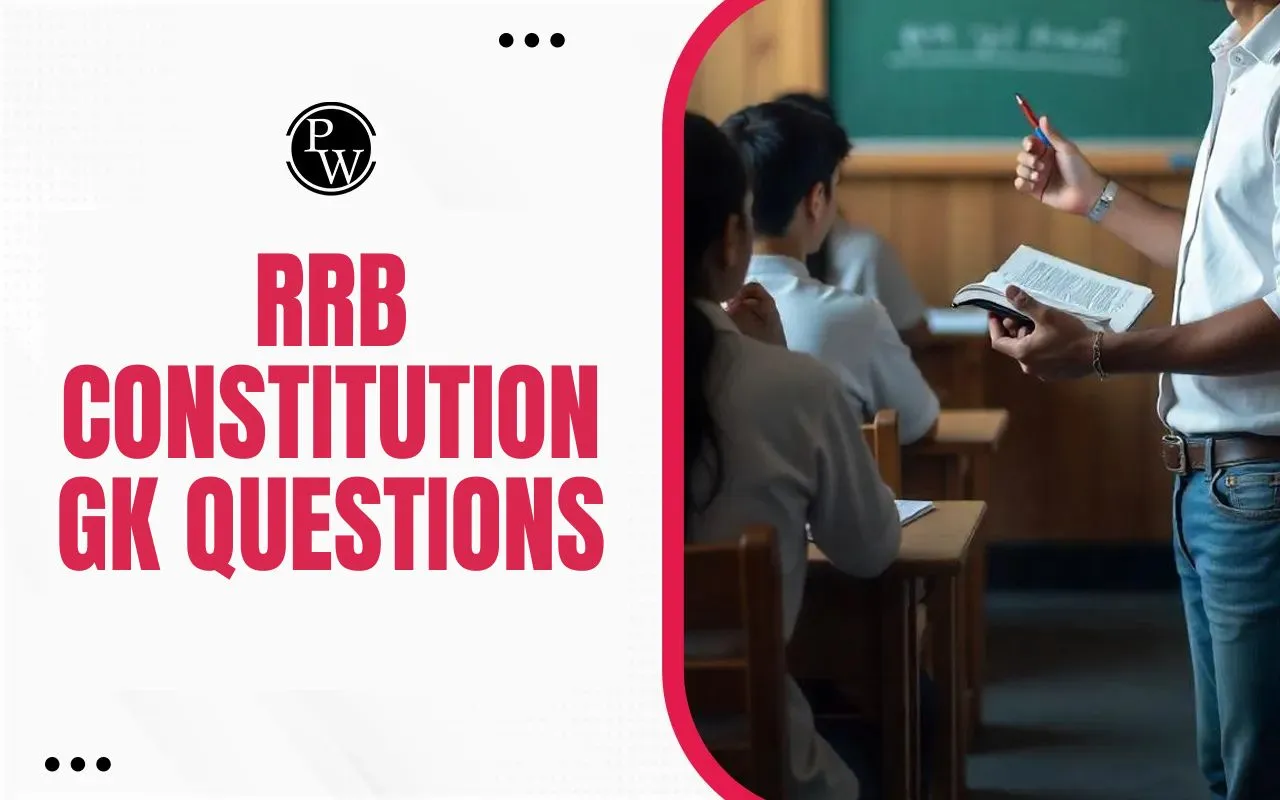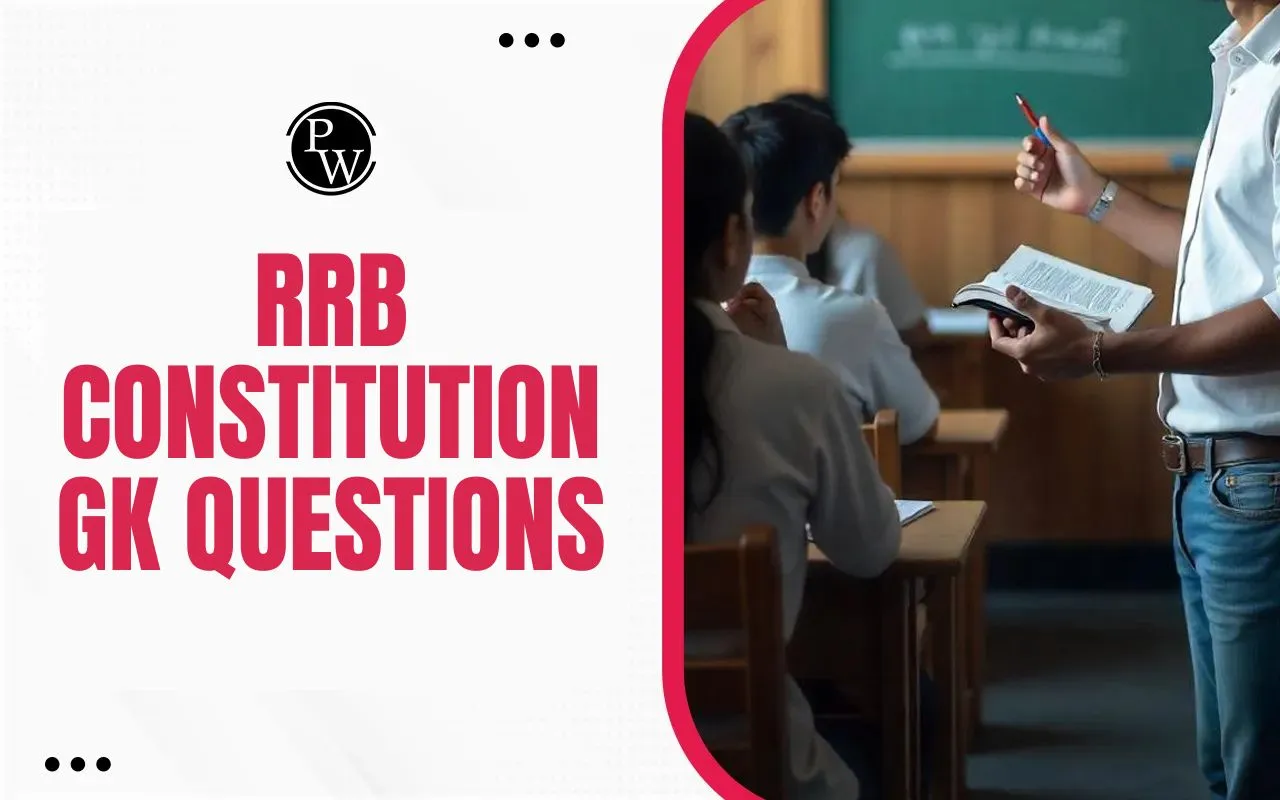

RRB Constitution GK Questions test knowledge of the fundamental law of the land, the Indian Constitution. Questions from this topic check the understanding of the historical background, articles, schedules, parts, and constitutional amendments. Having knowledge about these topics is important for improving performance in the General Awareness part of the RRB examinations.
Students who are preparing for RRB NTPC and RRB Group D need to concentrate on learning objective questions for railway exams from Indian Constitution. Regularly solving RRB Constitution GK quiz and practising from an RRB Constitution GK PDF download will help in improving speed. Furthermore, studying Indian polity and constitution questions for RRB from previous year papers provides help to understand the question pattern and frequently asked topics.
RRB Constitution GK Questions Section Overview
The Constitution section is an important area under General Awareness in RRB exams. Questions are based on facts and need a proper understanding of important provisions, historical milestones, and constitutional bodies. Candidates should prepare this section completely, as it consistently carries significant marks. The table below provides a general overview of the importance of Constitution GK questions in various RRB exams:
|
RRB Constitution GK Questions Section Overview |
|||
|
Exam Name |
Estimated Number of Questions (Approx.) |
Difficulty Level |
Estimated Weightage in GA Section |
|
RRB NTPC (CBT 1 & 2) |
3 to 5 |
Easy to Moderate |
Moderate |
|
2 to 4 |
Easy |
Moderate |
|
|
RRB ALP & |
2 to 4 |
Easy to Moderate |
Moderate |
Note: The number and difficulty of questions may differ every year depending upon the exam pattern and paper trend. The figures mentioned above are estimates only for reference. Candidates are advised to follow the official RRB notification for the latest examination trends.
Important Indian Constitution GK Topics for RRB
- Indian Constitution GK Questions for RRB cover various aspects of the constitution. Students need to prepare all topics. A complete understanding of these concepts helps candidates score better. Here are some of the important Indian polity and constitution questions for RRB topics:
- Constitutional History and Making: Cabinet Mission, Constituent Assembly, Drafting Committee, time taken for completion, and adoption date.
- Key Features: Sources of the Constitution, blend of rigidity and flexibility, and single citizenship.
- Preamble: Major terms like Sovereign, Socialist, Secular, Democratic, Republic, Justice, Liberty, and Equality.
- Parts, Articles, and Schedules: Knowledge of the total numbers and the subject matter of important Parts and Schedules for example, schedules 8, 9, 10, 12.
- Fundamental Rights and Duties: Understanding Articles 12-35 (Rights) and Part IV-A (Duties).
- Directive Principles of State Policy (DPSP): Articles 36-51.
- Constitutional Bodies: Election Commission, UPSC, CAG, Finance Commission.
- Parliament: Structure, President, Lok Sabha, Rajya Sabha, sessions, and legislative procedure.
- Executive: President, Vice-President, Prime Minister, Council of Ministers.
- Judiciary: Supreme Court custodian of the Constitution and High Courts.
- Constitutional Amendments: Important amendments like the 1st, 42nd, 44th, 61st, and 73rd/74th Amendments.
Note: Aspirants memorize the time taken for the Constitution's creation (2 years, 11 months, 18 days )and the important dates like the adoption date (November 26, 1949) and the commencement date (January 26, 1950).
RRB Constitution GK Questions PDF Links
An RRB Constitution GK PDF download with solutions is a valuable resource to revise all important topics efficiently. These PDFs usually contain formula-based questions, previous year queries, and detailed solutions. Here is the link to download GK questions in Hindi and English:
|
RRB Constitution GK Questions PDF Links |
|
|
PDF Title |
Download Link |
|
RRB Constitution GK Questions English |
|
|
RRB Constitution GK Questions Hindi |
|
Important Constitution GK Questions for RRB Exams
Here is a selection of multiple-choice questions on the Indian Constitution, suitable for RRB exams, based on the provided material:
Who is considered the architect of the Indian Constitution?
(A) Dr. B.R. Ambedkar (B) Mahatma Gandhi (C) Jawaharlal Nehru (D) Sardar Vallabhbhai Patel
How much time did it take in the creation of the Indian Constitution?
(A) 2 years 11 months 18 days (B) 3 years 10 months 28 days (C) 4 years 8 months 10 days (D) 5 years 7 months 15 days
The constitution of India was adopted by the Constituent Assembly in the year:
(A) 1947 (B) 1949 (C) 1950 (D) 1948
The "Cripps Mission" was sent to India by the British government in which year?
(A) 1940 (B) 1942 (C) 1945 (D) 1947
The "August Offer" was announced by the British government in which year?
(A) 1940 (B) 1942 (C) 1945 (D) 1947
The Cabinet mission arrived in India in:
(A) March 1946 (B) October 1946 (C) August 1946 (D) January 1946
Who among the following was NOT a minister of Cabinet Mission Plan, 1946?
(A) Sir Pethick Lawrence (B) Lord Wavell (C) Sir Stafford Cripps (D) Alexander
The total membership of the Constituent Assembly was 389, of which representatives of princely states were:
(A) 102 (B) 84 (C) 93 (D) 109
How many members were present at the Constituent Assembly's first meeting?
(A) 211 (B) 212 (C) 213 (D) 214
Which of the following gave the idea of the Constituent Assembly for India?
(A) Simon Commission (B) Rajaji Formula (C) Wavell's Plan (D) Cabinet Mission Plan
A Constitution is:
(A) A document which specifies the way of governance (B) A document which specifies the way rights of common people (C) A document that specifies the general conduct of people (D) All the above
The Constitution of India is:
(A) Flexible (B) Rigid (C) Combination of Flexible and Rigid (D) Can't be said
A Constitution:
1. Expresses the aspirations of the people about creating a good society.
2. Lays down limits on the powers of the government and tells us what the rights of the citizens.
(A) Only I (B) Only II (C) Both I and II (D) None
How many schedules are there in the Indian constitution?
(A) 18 (B) 20 (C) 12 (D) 14
According to the constitution, the Indian parliament has been divided into how many parts?
(A) 3 (B) 5 (C) 7 (D) 11
Indian Constitution currently contains how many Parts?
(A) Twelve Parts (B) Twenty-two Parts (C) Eighteen Parts (D) Twenty-five Parts
The feature of single citizenship in the Indian Constitution was borrowed from the Constitution of:
(A) Britain (B) Canada (C) United States of America (D) Australia
Which of the following is the custodian of the Constitution of India?
(A) The President of India (B) The Prime Minister of India (C) The Lok Sabha Secretariat (D) The Supreme Court of India
The first amendment to the Constitution of India was made in the year:
(A) 1954 (B) 1950 (C) 1959 (D) 1951
On which date was the Constitution of India adopted by the Constituent Assembly?
(A) December 9, 1946 (B) November 26, 1949 (C) January 26, 1950 (D) August 15, 1947
Benefits of Practicing Constitution GK for RRB Exams
Practicing RRB Constitution GK Questions is an important part of exam preparation. Candidates who consistently study and solve questions on the Indian Constitution perform better in the General Awareness section of RRB exams. This continuous engagement with the material improves performance by quick recall of factual information.
Some key benefits include:
-
Improves Factual Recall: Regular practice helps in memorizing important articles, dates, amendments, and committee names.
-
Enhances Speed and Accuracy: Being familiar with the question types allows candidates to answer quickly and correctly in a time-bound exam.
-
Builds a Strong Foundation: A clear understanding of the Constitution forms the basis for Indian Polity and Constitution questions for RRB and other government exams.
-
Helps in Identifying Trends: Solving previous year RRB Constitution GK questions highlights frequently tested topics and question patterns
-
Strengthens Conceptual Clarity: Helps in clearing complex concepts like the blend of flexible and rigid structure of the Constitution
-
Boosts Confidence: Confidence in the General Awareness section is crucial for maximizing the overall score.
PW provides Railway exam content, including Railway Exam Blogs, sample papers, mock tests, guidance sessions, and more. Also, enroll today in the Railway Online Coaching for preparation.
